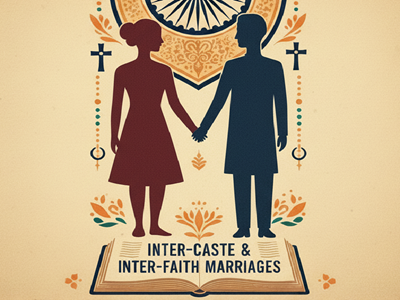Legal Frameworks and Challenges for Inter-caste and Inter-faith Couples in India
Date: November 8, 2025
Marriage in India is not merely a private contract between two individuals but a social institution deeply intertwined with religion, caste, and community norms. While the Indian Constitution guarantees liberty, equality, and the right to choose one’s partner, inter-caste and inter-faith unions often face complex legal and social hurdles. Despite a progressive legal framework, the co-existence of personal laws, procedural barriers, and societal intolerance continues to challenge the constitutional ideal of individual freedom.
Constitutional Safeguards
The foundation for the right to choose one’s partner lies in Articles 14, 15, 19, 21, and 25 of the Constitution of India:
- Article 14 ensures equality before the law.
- Article 15(1) prohibits discrimination on grounds of religion, race, caste, sex, or place of birth.
- Article 21 guarantees the right to life and personal liberty, which courts have interpreted to include the right to marry a person of one’s choice.
- Article 25 guarantees the freedom of religion and choice of belief.
The Supreme Court has repeatedly emphasized that these rights protect adults who marry outside caste or religion.

Landmark Case: Shafin Jahan v. Asokan K. M. (The Hadiya Case)
In Shafin Jahan v. Asokan K. M. (2018), the Supreme Court held that “the right to marry a person of one’s choice is integral to Article 21.” The Court restored the autonomy of Hadiya, an adult woman who had converted and married a Muslim man, declaring that neither state nor parents could interfere in such personal decisions.
The Special Marriage Act, 1954 (SMA)
The Special Marriage Act, 1954 provides the principal secular framework for marriages between individuals of different religions or castes. It allows couples to marry without conversion, emphasizing civil and secular values over religious formalities.
Salient Features:
- Section 4: Conditions for marriage (age, monogamy, sound mind).
- Sections 5–7: Require a 30-day public notice to the Marriage Officer, inviting objections.
- Section 15: Confers legitimacy and legal protection to the marriage, irrespective of religion or caste.
Legal Complications of the SMA
The 30-day notice period has been widely criticized for endangering couples, as family members or vigilante groups often use it to trace and harass them. Some states even publish the notice publicly, violating privacy.
In Pranav Kumar Mishra v. Govt. of NCT of Delhi (2009), the Delhi High Court held that the public notice requirement violates the couple’s right to privacy and liberty under Article 21, suggesting that authorities should not insist on unnecessary disclosure.
Personal Laws and Conflicts
Religious personal laws—The Hindu Marriage Act (1955), Muslim Personal Law, Christian Marriage Act (1872), and Parsi Marriage and Divorce Act (1936)—generally apply when both partners belong to the same faith. However, they create complications for inter-faith unions:
- Under Muslim law, a Muslim woman marrying a non-Muslim man is not recognized as valid unless the man converts to Islam.
- Under The Hindu Marriage Act, both parties must be Hindus at the time of marriage.
Thus, couples who wish to maintain their respective religions must rely exclusively on the Special Marriage Act 1954.
Judicial Protection for Inter-caste and Inter-faith Marriages

- Lata Singh v. State of Uttar Pradesh (2006): The Supreme Court upheld the right of an adult woman to marry a person of her choice, condemning “honor killings” and violence against inter-caste couples. The Court directed state governments to ensure police protection to such couples.
- Shakti Vahini v. Union of India (2018): The Supreme Court directed the government to establish safe houses and preventive measures against “honor killings,” emphasizing that “the consent of family or community is not necessary for marriage between two adults.”
- Salamat Ansari v. State of U. P. (2020): The Allahabad High Court ruled that the right to live with a person of one’s choice, irrespective of religion, is part of Article 21, overturning earlier rulings that disfavored inter-faith relationships without conversion.
Anti-Conversion or “Freedom of Religion” Laws
Several states have enacted laws regulating religious conversion, especially for marriage. These laws require prior intimation or approval from district authorities before conversion. While the intention is to prevent coercive conversions, in practice, they often deter voluntary inter-faith marriages.
Socio-Legal and Administrative Challenges
Despite progressive rulings, couples face significant hurdles:
- Social Backlash and Honor Crimes: Families and communities still consider inter-caste or inter-faith unions as social defiance. “Honor killings” persist, particularly in North India.
- Bureaucratic Obstacles: Marriage officers frequently delay or discourage registration under the SMA.
- Police Apathy: Despite judicial directions, police often fail to provide protection, forcing couples to approach courts.
- Inheritance and Succession Conflicts: Inter-faith marriages under SMA are governed by the Indian Succession Act, 1925, which often leads to disputes within families who follow personal laws.
Reform and the Way Forward
- Abolish or Reform the 30-Day Notice Rule: The notice period should be replaced by confidential verification to protect privacy.
- Uniform Implementation of Protection Protocols: All states must ensure functional safe houses and swift police response as directed in Shakti Vahini.
- Sensitization of Authorities: Registrars, police, and magistrates need human-rights training to prevent moral policing.
- Judicial Consistency: Courts must uniformly uphold the primacy of constitutional rights over community norms.
The legal framework for inter-caste and inter-faith marriages in India is rooted in constitutional liberty and secular values. Yet, deep-seated social prejudices, procedural barriers, and inconsistent enforcement dilute these rights. True progress requires not only legal reform but also a transformation of societal attitudes, ensuring that love and equality transcend the boundaries of caste and faith.